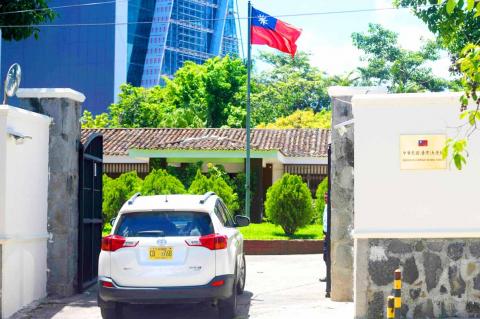A number of US lawmakers on Tuesday expressed their support for Taiwan following the termination of diplomatic ties with El Salvador, which decided to switch recognition to China, allegedly for financial aid.
The Central American country switched its recognition from Taiwan to China after Taipei refused to invest an “astronomical sum” of money in its Port of La Union development project, the Ministry of Foreign Affairs said.
To voice the US’ support for Taiwan and condemn El Salvador for abandoning its democratic ally of 85 years in favor of a communist regime, US senators Cory Gardner and Marco Rubio introduced an amendment to a “minibus” appropriations bill on restricting US funding to the Central American nation, a statement on Gardner’s official Web site said.

Photo: AFP
“I urge for it [the amendment] to be included in the final bill. This amendment will send a direct message to Taiwan’s allies that the US will use every tool to support Taiwan’s standing on the international stage and will stand up to China’s bullying tactics across the world,” said Gardner, who is chairman of the US Senate Foreign Relations Subcommittee on East Asia, the Pacific and International Cybersecurity Policy.
Gardner also warned El Salvador that the wrong decision “will negatively influence United States relations with El Salvador.”
In a similar vein, Rubio described El Salvador’s decision as “a grave mistake that harms relations with the US and will likely prove to be costly and short-sighted, given what we know about China’s ‘debt traps’ and economic exploitation globally.”
US Senator Tom Cotton on his Web site urged China to refrain from interfering in Taiwan’s diplomatic relations with other countries.
“Proud, confident nations that aspire to great power status don’t obsess about the diplomatic relations of their small neighbors,” Cotton said.
US representatives Ileana Ros-Lehtinen and Mario Diaz-Balart used Twitter to express disapproval of China’s attempt to isolate Taiwan diplomatically.
US Representative Albio Sires voiced concern on his Web site over the “growing Chinese influence in the region that has caused multiple countries to break with Taiwan in favor of Chinese investment.”
Chinese promises of investment “are little more than empty promises that do not create real jobs, only benefit Beijing in the long run and do not provide any real assistance to the hardworking people they claim to benefit,” Sires said.

NATIONAL SECURITY THREAT: An official said that Guan Guan’s comments had gone beyond the threshold of free speech, as she advocated for the destruction of the ROC China-born media influencer Guan Guan’s (關關) residency permit has been revoked for repeatedly posting pro-China content that threatens national security, the National Immigration Agency said yesterday. Guan Guan has said many controversial things in her videos posted to Douyin (抖音), including “the red flag will soon be painted all over Taiwan” and “Taiwan is an inseparable part of China,” while expressing hope for expedited “reunification.” The agency received multiple reports alleging that Guan Guan had advocated for armed reunification last year. After investigating, the agency last month issued a notice requiring her to appear and account for her actions. Guan Guan appeared as required,

Japan and the Philippines yesterday signed a defense pact that would allow the tax-free provision of ammunition, fuel, food and other necessities when their forces stage joint training to boost deterrence against China’s growing aggression in the region and to bolster their preparation for natural disasters. Japan has faced increasing political, trade and security tensions with China, which was angered by Japanese Prime Minister Sanae Takaichi’s remark that a Chinese attack on Taiwan would be a survival-threatening situation for Japan, triggering a military response. Japan and the Philippines have also had separate territorial conflicts with Beijing in the East and South China

A strong cold air mass is expected to arrive tonight, bringing a change in weather and a drop in temperature, the Central Weather Administration (CWA) said. The coldest time would be early on Thursday morning, with temperatures in some areas dipping as low as 8°C, it said. Daytime highs yesterday were 22°C to 24°C in northern and eastern Taiwan, and about 25°C to 28°C in the central and southern regions, it said. However, nighttime lows would dip to about 15°C to 16°C in central and northern Taiwan as well as the northeast, and 17°C to 19°C elsewhere, it said. Tropical Storm Nokaen, currently

PAPERS, PLEASE: The gang exploited the high value of the passports, selling them at inflated prices to Chinese buyers, who would treat them as ‘invisibility cloaks’ The Yilan District Court has handed four members of a syndicate prison terms ranging from one year and two months to two years and two months for their involvement in a scheme to purchase Taiwanese passports and resell them abroad at a massive markup. A Chinese human smuggling syndicate purchased Taiwanese passports through local criminal networks, exploiting the passports’ visa-free travel privileges to turn a profit of more than 20 times the original price, the court said. Such criminal organizations enable people to impersonate Taiwanese when entering and exiting Taiwan and other countries, undermining social order and the credibility of the nation’s